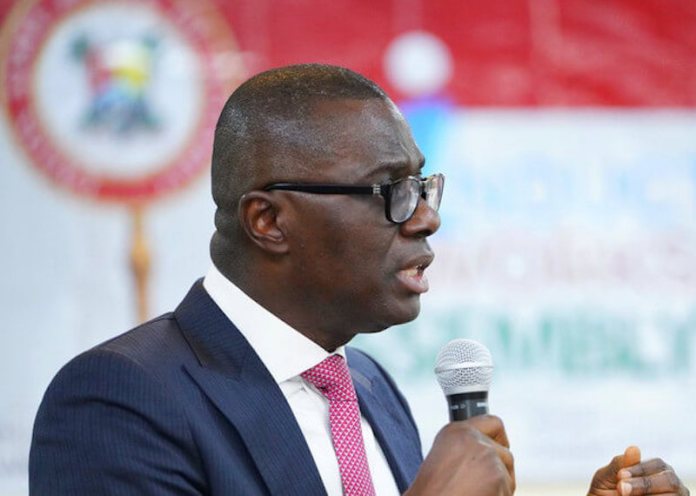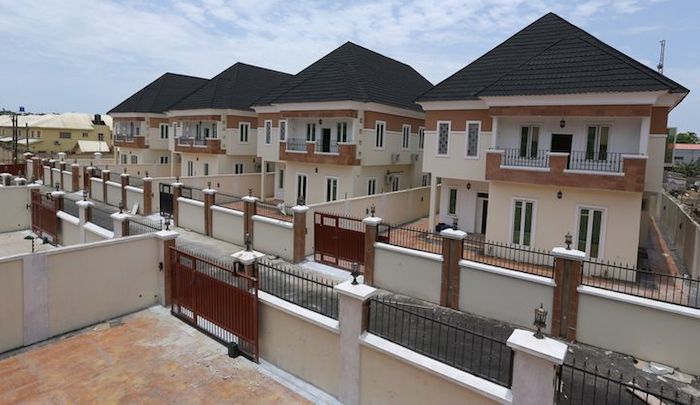
Dissecting Development in Real Estate Industry
Recently, the Lagos State Governor, Mr. Babajide Sanwo-Olu, signed into law three bills that were earlier passed by the state House of Assembly. The governor signed the law to regulate real estate transactions in Lagos State and the law to provide for the registration of cooperative societies in the state as well as the law to regulate ownership, licensing, and sales of pets and to prohibit and restrict people from having in custody dangerous animals in public places.
“The law to regulate the real estate transactions in Lagos State will help to protect the citizens who fall prey to many real estate professionals and it will also help players in the real estate sector to know what is expected of them and for the government to be able to track who is doing what in the sector.
“The law to provide for the registration of cooperative societies in Lagos State will make it easy to regulate the operations of thousands of cooperative societies in the state for harmonious cooperation,” the governor said.
In an attempt to address the burdens in the real estate and trying to key into the new Lagos State regulatory act, Fine & Country West Africa Ltd, through its recent webinar tagged “Real Estate Outlook 2022: Navigating The Exchanging Landscape of the Luxury Residential and Prime Commercial Office market”, gave some hints on trends and developments in the real estate industry.
In her keynote message, the Chief Executive Officer, Fine & Country West Africa Ltd, Mrs. Udo Okonjo, did a diagnosis of the changing trends real estate properties, especially concerning the luxury and commercial ones.
“What we see in the luxury segment, especially in the Ikoyi, Victoria Island axis is a rise in tall buildings. There are updates where we will have dollar projects who are active in the luxury apartment which is what we refer to as dollar economy, which is the return around naira is much riskier to work with. For three to five years now, the top developers have stayed in the dollar economy.
“However, we have some micro-segments within the luxury area where developers refer to themselves as affordable luxury and we can find most of them in the naira space even though they are also tall buildings between eight and 12 floors. It’s instructive to know that the taller the building the more sophisticated the structure that is aspired which results in the cost investment, which reflects on pricing.”
She pointed out: “The average price for residential space in the luxury segment ranges from $2,500 to $4,500 per square meter. For the middle range, $2,850 to $3,500. And when we talk about the exclusive spaces and penthouses, which range from $4,500 and up. That is for the 000.1 per cent. It is important to recognise that most luxury developers are ready to work with their target audience. The typical timeline to work on this project is about four to seven years. The luxury space is actually for patient investors.”
“These investors are either industrialists or investors in other economies or for organisations that have capital in the country and that capital has been dedicated to the Nigerian market. The way they can diversify is to invest in luxury residential because that’s an area that helps them hold the value.
“Moving on to the commercial segment, we discovered that some of these investors are also similar. Some of them are the multinational, public, and public-private sectors, which invest in commercial buildings. One of the characteristics of these investors is that they are patient and are very selective. Some of the developers hold the properties for a long time until they see the right investors.
“One of the things we see is investors, who worry about their naira being stuck as a result of not being able to convert their naira to dollars but consider real estate as a safe place to invest. They may not have all the funds, but are willing to collaborate for commercial projects and luxury spaces. They depend on the location from Ikoyi to Victoria Island and of course, we have the easement of Grade A offices which we have certain criteria for assessing Grade A offices locally and internationally. We have the Grade B offices and at this point, one begins to see the reflection of prices in the type of properties they are,” she added.
Speaking further, Okonjo emphasised flexibility as the rule of Nigeria’s real estate industry as a way of dynastic approach.
“One important thing I want to mention is that: flexibility is the name of the game. Whereas, many developers and landlords of these offices were inflexible, in the last two years, COVID, downsizing of offices and all of that, there is a clear sense in which landlords are being extremely practical by giving a lot of concessions and discounts. They will rather give concessions on others rather than give on price per square metre.
“When people say there are a lot of vacant buildings, I always ask, which ones? Like I said earlier, luxury apartments take time. They take four to seven years to construct. Usually, they are sold out within that time. From the luxury developer’s point of view, that is success for preparing a product, presenting to the market and they take it. When it comes to the tenancy aid for those who bought with their investment when we weigh corporate or high net worth individuals who are looking out to occupy those types of building, the idea that there are a lot of vacancies which springs up the question of, which building? There is a flat to quality and we can’t be overemphasised, that in light of that tragedy that happened last year the flat to quality was more told.
“From the perspective of the size of the market, in terms of our population, Lagos represents the Nigerian economy, the West African economy, or indeed the African economy and we have not started yet. We don’t have 50 tall buildings in Lagos that we can refer to as luxury residential. In that point of view, people who invest in that particular segment have accomplished especially in the last two years with the pandemic, there is a more philosophical approach to some of these investors when they chose to invest their money.
“We need to recognise that luxury is not for everyone and yes we have a lot of vacant properties and the question is, what type of properties? If you check, they are not good quality properties and are not built to the demand and expectations of the market. Good quality projects have strong demand and therefore are reserved. Some people have a property in VGC and also in Lakowe, which means that the concept of lifestyle is what we should start looking at where it’s not just about the central, Ikoyi for example.
“The straight answer to why we still have vacant properties, the answer is that is not of good quality. It’s more around quality and a fit for the market,” she said.
Why Monthly Rental Can’t Work
In recent times, the Minister for Works and Housing, Babatunde Fashola, also former Governor of Lagos State, has been quoted, proposing migration from yearly to monthly rent. The Lagos State government also proposed the same migration.
According to the Chief Executive Officer, UACN Property Development Company, Mr. Odunayo Ojo, who noted that although the migration did not apply to the luxury real estate industry, but can’t work.
“Generally, across the world, rent editing doesn’t work, especially in a free market. Lagos State has tried rent editing before in the 1990s designating it in certain areas, but nobody is hearing about it anymore even though there was an edit that was enacted. I think this does not apply to the market we are talking about in the luxury end, where restrictions and rent editing are not healthy. These are people who have the means and are ready to go into commercial negotiations and close the deal. Also because the supply is limited, even though there is regulation but also a separate commercial arrangement for such property, “ he said.
The New LASG Regulatory and its Implications
Giving a clear picture of the new Lagos State transaction regulatory law and existing laws governing the real estate industry, Head of Legal Unit, Lagos State Land Bureau, Mrs. Omobola Omotimirin, said the laws had been enacted to secure a level playing ground for investors in the industry.
“As we all know that Governor Babajide Sanwo-Olu recently gave assent to the real estate regulatory law. The idea, according to the governor, is to improve the landscape of the real estate industry for the benefit of the land, property owners, investors, and the public at large.
“We as a government ensure that the activities in the industry tally with the law. We understand why we have a lot of problems within the regulatory industry, especially in the real estate industry which we refer to as ‘Evergreen Opportunity’. Lagos State has 3,577 square kilometres of land within the state and we have a lot of people standing for the little space we have.
“We want to ensure that investors within the real estate industry can invest properly and meet the worth of their investments. Law and regulations are good but the reality of it all is that we have to ensure that we provide the appropriate land policies so that there will be a kind of interface between the government and the public-private sector. The development of ICT is one area the government has been working on. We have moved far to the point that we can identify some challenges, most of the land use acts, we have had issues with it and people have alleged on some issues. Some people don’t know why they have to approach the governor for consent. We don’t have a choice because if you do not regulate any society, then there will be a lot of problems.
“We have a lot of undocumented properties and other problems that we have identified in the past. The regulations are important as regards what we need to do, but we are at this point to move on.
“We have all our laws out there for people to access easily. We have them online so players and readers understand. We have documents on market value if you want to invest in a property and you want to register for a title. We’ve planned for the small players, those who already own land before the Land Use Act of 1978.
“We have the Lagos State Land registration law of 2015, which has brought several innovations as regards the registration of title, especially quality control, the standard of service to the members of the public, reduction of fake documentation, etc. We have our latest handbook which came out in 2021 on all we need to know about Lagos land registration and it’s available for free.
“We have done a lot and we have realised that we need to do more because it is 2022 and we have a wider outlook for what we expect,” she said.
Speaking on the bureau’s effort on incorporating ICT into the system Omotimirin said: “At the bureau, what we are also working on is to ensure that the land registration in Lagos State is automated so that everyone can have access to it from the comfort of their home. It’s an Integrated Land Automated System. The system gives access remotely to make it easy for everyone to access and register their interest without coming to the bureau to carry out their transaction. We are currently at the pilot stage but that will be the real estate outlook for 2022.
“We are also considering more collaboration with our investors. I want to say that the regulations are there for implementation so everyone who is a stakeholder in the regulatory industry must understand the laws and follow them. We want to again ensure investor confidence in the real estate sector.”
Source:Thisdaylive
Similar Topics
US Election Race Intensifies: How Results Could Impact Nigeria’s Real Estate Market As the...
a month ago Read MoreEquatorial Guinea Official Baltasar Engonga Ebang’s Video Sparks Controversy In recent days,...
a month ago Read MoreNigeria’s digital real estate company, Sytemap, has raised concerns over the ongoing trust...
2 months ago Read MoreGovernor Babajide Sanwo-Olu of Lagos State has urged for more investment to address the persistent...
2 months ago Read MoreHousing sector stakeholders have raised concerns that the rising interest rates in the country are...
2 months ago Read MoreLagos State Governor, Babajide Sanwo-Olu, has emphasized the significance of innovation,...
2 months ago Read MoreThe Association of Private Practicing Surveyors of Nigeria (APPSN), a subgroup of the Nigerian...
2 months ago Read MoreNigeria has been admitted into WorldSkills International, marking a historic milestone in the...
3 months ago Read MoreThe Federal Government has launched the Ministry of Finance Incorporated Real Estate Investment...
3 months ago Read MoreThe National Board for Technical Education has inaugurated the Sector Skill Council for...
3 months ago Read MoreThe Environmental Defense Fund has partnered with Africa Practice to combat climate change in...
3 months ago Read MoreThe Minister of Housing and Urban Development, Ahmed Dangiwa, has reiterated the crucial role of...
3 months ago Read MoreThe Real Estate Developers Association of Nigeria has announced initiatives aimed at enhancing...
3 months ago Read MoreThe Global Environment Facility has approved $3.28m to tackle land degradation in Kebbi State under...
3 months ago Read MoreThe commercial real estate market is currently grappling with several major challenges, including...
3 months ago Read MoreReal estate development is a key driver of economic growth in any region, and Africa is no...
3 months ago Read MoreThe Federal Government has signed a Memorandum of Understanding with Shelter Afrique...
3 months ago Read MoreThe Federal Government has issued a 90-day deadline for subscribers of the National Housing...
3 months ago Read MoreThe Minister of Housing and Urban Development, Ahmed Dangiwa, has disclosed that plans are underway...
4 months ago Read MoreA real estate firm, Gestpoint Nigeria Limited, has implored the Federal Government to simplify the...
4 months ago Read More
















